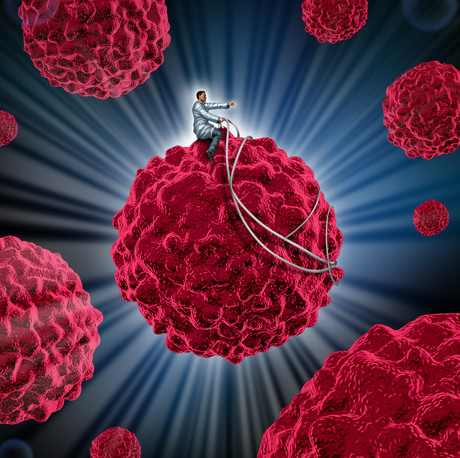Lung cancer subtype responsive to immunotherapy

Melbourne researchers have discovered that an aggressive lung cancer subtype is susceptible to immunotherapy, thanks to the identification of special markers expressed in tumours.
The research was led by Dr Sarah Best and Dr Kate Sutherland from the Walter and Eliza Hall Institute (WEHI), working with colleagues at Metabolomics Australia at the University of Melbourne’s Bio21 Institute. Their study focused on the role of two cell signalling pathways — KEAP1/NRF2 and PI3K — which are known to be involved in human lung cancers called adenocarcinomas — the most common form of the cancer, accounting for around 40% of cases.
“More than one in five lung adenocarcinomas have alterations in the KEAP1/NRF2 pathway, suggesting it is a major cancer driver,” Dr Sutherland said. “These cancers are very aggressive, are resistant to standard therapies and have a poor prognosis, so new therapies are urgently needed.”
Published in the journal Cell Metabolism, the study revealed that non-stop signalling caused by mutations in the KEAP1/NRF2 and PI3K pathways causes lung adenocarcinomas to develop. According to Dr Best, “This is the first time anyone has shown that these alterations directly cause lung adenocarcinomas.
“With this knowledge, we can further investigate how targeting those pathways could lead to therapies for these aggressive and hard-to-treat cancers,” she said.
Furthermore, said Dr Best, the study found that adenocarcinomas caused by altered PI3 kinase and NRF2 pathways “express markers that leave them susceptible to immunotherapy” — a relatively new treatment that effectively “enables our immune cells to see the tumour cells again and kill them” but is not responsive in all patients.
“Using preclinical models, we showed for the first time that these tumours have the markers that respond to anti-PD-1 and anti-CTLA-4 immunotherapies, which are some of the most exciting new cancer therapies being investigated in the clinic,” said Dr Best.
“But more importantly, we showed that these immunotherapies were effective in fighting the tumours and leading to tumour regression in our preclinical models.”
Dr Sutherland added that the researchers have also identified what she calls “a unique ‘breadcrumb’ trail that the cancers leave behind in the blood” — a “molecular signature” that could be utilised as part of a simple blood test in future.
“Our hope would be that the test could identify patients likely to respond to immunotherapies, but also that it could be a simple, non-invasive blood test for the early detection of these lung cancers,” she said.
“The next steps would be to analyse human samples to prove the same is true in lung adenocarcinoma patients, but we need more funding for that work to continue and to generate results that will lead to better detection and treatments for the community.”
Neurosensing/neurostimulation implants session to be held on Monday
On Monday, a session at UNSW Sydney will include people who are benefiting from bioelectronics...
argenx and Monash University partner against autoimmune diseases
To advance a pioneering molecule for autoimmune diseases, global immunology company argenx has...
Archer completes potassium sensing alpha prototype
Quantum technology company Archer Materials Limited has developed an early Biochip prototype...



